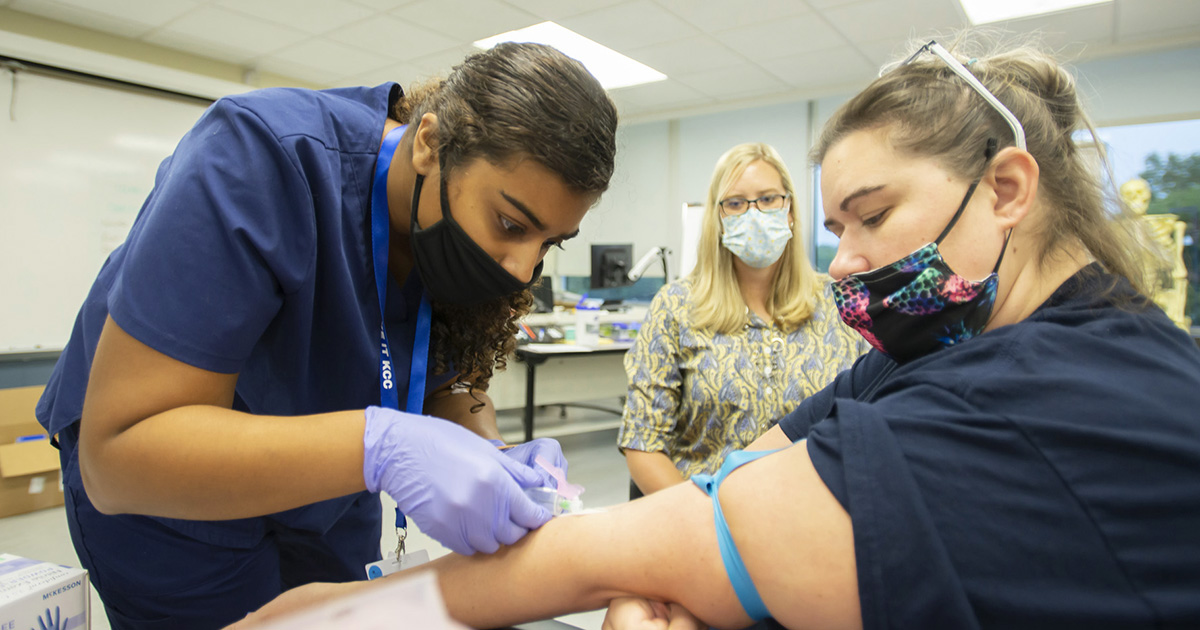Preparing For the Certification Exam After Your Phlebotomy Training Course
Preparing For the Certification Exam After Your Phlebotomy Training Course
Blog Article
The Course to Qualification: Understanding the Phlebotomy Training Training Course Trip and Its Importance
As you consider the course to certification in phlebotomy, it's crucial to comprehend the function you'll play in health care. Your training will certainly cover vital skills, from blood collection techniques to patient communication.

The Duty of Phlebotomists in Healthcare
Phlebotomists play a crucial role in the health care system, serving as the crucial link in between individuals and crucial analysis testing. You'll carry out blood draws, ensuring samples are gathered precisely and securely. Your experience helps in diagnosing medical problems, keeping track of health and wellness, and leading treatment decisions.
In your day-to-day interactions, you'll need to develop depend on with clients, making them really feel comfortable throughout what could be a stressful experience. You are accountable for classifying and handling samples very carefully to stop contamination or mistakes, which can influence examination results.
Past this, you'll usually function alongside doctors and nurses, connecting crucial information about individuals' problems. Your role is essential in preserving the operations in healthcare settings, making sure prompt and precise results. By mastering your abilities, you add meaningfully to person treatment, making you an indispensable component of the medical team. Accepting this duty is essential to your success as a phlebotomist.
Overview of Phlebotomy Training Programs
When exploring phlebotomy training programs, you'll discover various types designed to fit various timetables and finding out styles. Each program aids you establish essential skills like blood collection and individual interaction. Understanding these alternatives is key to picking the ideal course for your profession.
Kinds Of Educating Programs
Numerous types of training programs are readily available for those looking to become proficient in phlebotomy. Furthermore, some medical facilities and facilities offer on-the-job training programs, offering functional experience while you find out. Whatever course you choose, each program aims to outfit you with the essential abilities for a successful phlebotomy occupation.

Secret Skills Developed
Mastering phlebotomy requires a set of key skills that are created with extensive training programs. You'll discover technical skills like proper blood vessel option, needle insertion, and blood collection strategies. These hands-on methods guarantee you can carry out treatments safely and efficiently. Furthermore, interaction abilities are basic; you'll need to engage with patients, clarify procedures, and put them secure. Understanding makeup and physiology is vital, also, as it aids you find blood vessels and comprehend the body's reaction to blood draws. Finally, you'll acquire understanding of security procedures and infection control, ensuring you keep a sterile setting. Each of these skills is essential for your success as a licensed phlebotomist, making you an important property in any healthcare setting.
Key Elements of a Phlebotomy Program
In a phlebotomy course, you'll concentrate on vital topics that prepared for your future occupation. You'll participate in hands-on training that permits you to apply what you have actually learned in real-world setups. Both the curriculum and practical experience are essential for your success as a phlebotomist.
Core Educational Program Summary
While seeking a phlebotomy training program, you'll encounter a core educational program developed to furnish you with fundamental skills and expertise. Phlebotomy Courses Near Me. This educational program normally consists of makeup and physiology, concentrating on the circulatory system and comprehending blood parts. You'll also find out about various kinds of blood collection methods, including venipuncture and capillary slit strategies
In addition, infection control and security procedures are crucial parts, guaranteeing you know exactly how to maintain a clean and sterile environment. You'll examine patient interaction, stressing communication and compassion, which are vital for easing client stress and anxiety.
Hands-On Training Experience
Getting hands-on experience is an indispensable part of your phlebotomy training course. This functional training enables you to apply what you've learned in a real-world setup, boosting your skills and confidence. Phlebotomy Classes Near Me.
In addition, you'll obtain the opportunity to interact with patients, which is important for developing your interaction abilities. This combination of technological efficiency and interpersonal abilities is important for your success as a licensed phlebotomist. Ultimately, hands-on training is where concept fulfills method, solidifying your understanding and readiness for accreditation.
Certification and Licensing Demands
Prior to you can begin your profession in phlebotomy, it is important to comprehend the certification and licensing demands that differ by state. Most states need phlebotomists to hold a certification from an acknowledged organization, such as the National Phlebotomy Organization or the American Culture for Scientific Pathology. These accreditations typically include passing a test that checks your expertise and abilities in the field.
In addition to accreditation, some states have specific licensing needs. You might require to complete a certain variety of hours in professional method, submit proof of training, or undergo a history check. It is crucial to research your state's laws to see to it you fulfill all required requirements.
Staying informed regarding these needs not only helps you secure a placement however additionally enhances your credibility as a professional. By fulfilling these demands, you'll be well on your way to an effective job in phlebotomy.
Hands-On Training and Practical Experience
Hands-on training and sensible experience are important elements of your phlebotomy education, as they enable you to apply academic knowledge in real-world situations. During your training, you'll take part in supervised venipuncture, discover proper methods, and come to be acquainted with various blood collection tools. This direct participation is critical for building your self-confidence and review developing your abilities.
You'll function closely with knowledgeable specialists that can assist you with the nuances of patient interaction and sample handling. Each technique session not only strengthens your understanding however additionally prepares you for the hectic atmosphere of health care setups.
In addition, lots of programs integrate professional rotations, permitting you to experience varied settings, from healthcare facilities to outpatient clinics. This direct exposure assists you adjust to different obstacles and individual demands, guaranteeing you're well-prepared for your future duty. Embrace these possibilities, as they're vital to becoming a competent and compassionate phlebotomist.
Obstacles Dealt With During Training
While obtaining hands-on experience is vital, it is necessary to recognize the challenges that can arise anonymous during your phlebotomy training. You could come across stress and anxiety when executing procedures on genuine patients, particularly if you're new to the setting. The pressure to get whatever right can be frustrating. Furthermore, grasping the abilities required for blood draws takes practice; you may deal with strategy originally.
Time administration can additionally be a difficulty, as harmonizing theory, functional sessions, and individual dedications can feel challenging. You may encounter varying discovering speeds amongst your peers, resulting in feelings of insecurity if you think you're dropping behind. Ultimately, adjusting to the various personalities of instructors can be challenging, as each might have an one-of-a-kind training style.
Recognizing these barriers early on can prepare you for success and help you develop strength throughout your training trip.
Job Opportunities After Certification

As you obtain experience, you might also consider focusing on locations like pediatric or senior citizen phlebotomy, catering to certain client demands. Some phlebotomists pick to progress their jobs by ending up being laboratory service technicians or going after more education in healthcare fields.
Additionally, your qualification can result in functions in training or overseeing brand-new phlebotomists, permitting you to share your knowledge. With the health care market constantly expanding, your abilities will certainly constantly remain in need, paving the means for a steady and fulfilling profession. Welcome the possibilities awaiting you!
Often Asked Inquiries
What Is the Regular Period of a Phlebotomy Training Training Course?
Phlebotomy training programs normally last around 4 to eight weeks. You'll take part in hands-on technique, class guideline, and on the internet understanding. Completing this training prepares you for qualification and a satisfying career in medical care.
Are Online Phlebotomy Courses Available?
Yes, on the internet phlebotomy programs are readily available. They supply versatility and comfort, enabling you to research at your very own rate. Simply confirm the program is certified to satisfy certification demands and obtain important skills for your career.
Exactly How Much Does Phlebotomy Training Normally Cost?
Phlebotomy training generally costs in between $700 and $2,500, relying on the program and area. You must think about elements like training course size, consisted sites of materials, and hands-on experience when choosing the appropriate training for you.
What Are Usual Requirements for Phlebotomy Training?
Common requirements for phlebotomy training frequently consist of a senior high school diploma or GED, immunizations, and a history check. Some programs may likewise require basic medical care understanding or certifications, ensuring you're planned for hands-on training.
Can I Work While Finishing My Phlebotomy Training?
Yes, you can work while finishing your phlebotomy training. Many trainees equilibrium tasks with their researches, but make certain to manage your time properly to ensure you fulfill both work and training commitments efficiently.
Report this page